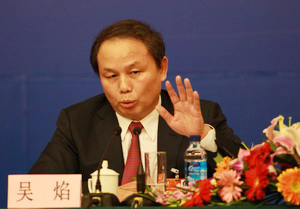

|
 Wu Yan, chairman of the board of The People's Insurance Company (Group) of China. |
"As urbanization in China accelerates, many problems tend to manifest," according to Wu Yan, chairman of the board of The People's Insurance Company (Group) of China, in his proposal on Chinese People's Political Consultative Conference sessions.
"China faces low urban carrying capacities and a widening rural-urban gap. People in urban and rural regions don't have equal access to basic public services. These problems will hinder China's urbanization process," The Economic Observer reported citing Wu.
The insurance industry has the capacity to assist the government in coordinating rural-urban development and improving security services and social management, Wu said.
In Wu's proposal, he expects the insurance industry to provide farmers with better medical and old-age insurance, public security services and financial support, which are conducive to rural-urban transformation.
The main priority in Wu's proposal is to assist governments in extending rural medical security coverage. Wu called for more joint medical insurance programs applied in Zhanjiang in Guangdong province and Taicang in Guangxi province.
For example, since April 2011, a PICC subsidiary company has been working with the local government of Taicang city in Chinese southeastern Jiangsu province. The government covers the insurance for all citizens registered in the medical insurance system and PICC gives patients back more than half of the amount that goes over 10,000 yuan.
PICC provides insurance for rural and urban patients with the same insurance quota. It signals China's move toward the application of a single nationwide medical security policy, according to Wu.
Wu also urges insurance companies to work with banks to provide financial support for rural businesses. Wu cited the cooperation between PICC and Shanxi Provincial Government as an example. PICC provides farm insurance for vegetable and fruit growers, and banks lend credit loans under preferable conditions for those who buy the insurance. As a result, vegetable and fruit farmers have received stronger credit loan fund support, and the insurance effectively helps farmers fend off risks.
Wu's third suggestion is for insurance companies to take part in providing long term compensation to farmers whose land has been expropriated. He suggested the amount of money be paid by insurance companies, local governments and property developers in proportion to the money they each earn once the expropriated land becomes tradable or transferable.
The last point in the proposal focuses on the insurance industry's efforts in improving public securities. In 2003, PICC introduced insurance for public security in Linyi city, China's eastern Shandong province. People bought insurance policies for 35 yuan for a year. A part of the cost was family property insurance fees. The buyers whose family properties were harmed could claim the insurance. The remaining amount was used to beef up local public security organs and infrastructures.
In the end, Wu suggested insurance companies provide a variety of services to farmers, so that they can become better prepared for rural-urban transformation.
For more in
 Frenchman engrossed by Dongyang wood carving
Frenchman engrossed by Dongyang wood carving
 2016 Chaos Communication Congress holds in Germany
2016 Chaos Communication Congress holds in Germany
 Century-old Shanghai Dashijie reopens for trial run
Century-old Shanghai Dashijie reopens for trial run
 Futuristic manned robot takes first steps in South Korea
Futuristic manned robot takes first steps in South Korea
 Snow sculptures and ice lanterns heat up Harbin
Snow sculptures and ice lanterns heat up Harbin
 Cyclists sit back as they pedal through Guangzhou
Cyclists sit back as they pedal through Guangzhou
 Liquor enterprises enter busy season in N China
Liquor enterprises enter busy season in N China
 Monkeys enjoy Christmas feast in Zhengzhou
Monkeys enjoy Christmas feast in Zhengzhou